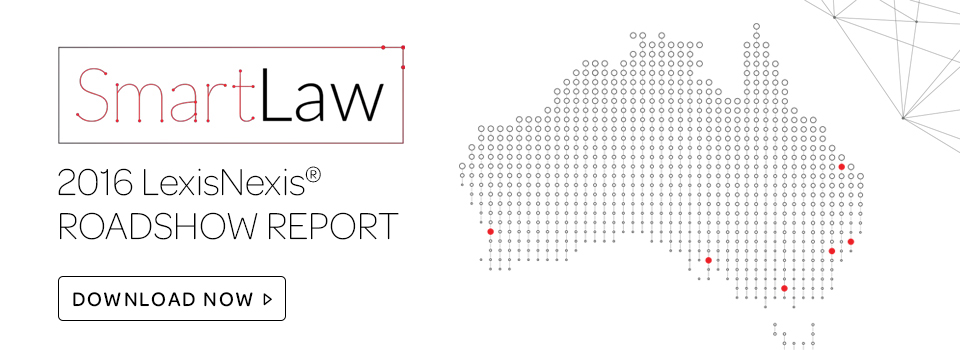Looking at the Future of Legal Services
20 May 2016 | Lisa Sylvester

What does the legal professional of the future look like?
Recently, a prominent thought leader on the direction and future of legal services visited Australia. This sparked a wave of social media comments on whether a 'lawyer' of the future may be something other than human, and whether some key legal tasks in the domain of the legal profession may be done by artificial intelligence or the like. What prompted this discussion was a series of seminars by Professor Richard Susskind on the 'Future of Legal Services'. I attended the focus session attended by in house corporate lawyers across Australia.
What does this mean for the Australian profession? Are there services which could make a legal professional's role easier or provide solutions to the risk of negligence that looms each day when providing legal advice to clients?
Alternative legal services models raise questions of:
Why do we have the legal profession and what problems do they solve?
What expertise do they need to perform the work?
What parts of the work could be done differently or in a more cost effective way?
Drivers of change
Should professionals consider change or perhaps be left behind to watch their competitors thrive?
Customers are looking at the value that the legal professional will bring to them. Even though the professional could be the most experienced in the area of law, what makes them different to others who have the same expertise? Lawyers are being challenged to provide more for less, being more efficient and putting themselves in the shoes of the non-legal mind.
"The competition that kills you doesn't look like you", commented Susskind on what could drive change in the mindset of the legal professional. For a client who does not want to leave their office to see their lawyer, mobile options may be inviting and time saving to address that client's need.
What practical steps should you consider to assess where you can add value, save costs or provide better service to your clients?
Decompose legal work
Does the work need to be done by one lawyer from start to finish? To break down the work performed, here are some of my points prompted by Professor Susskind to consider:
- Optimise process - within your practice, who would you go to as the expert in that area of work? Have you captured their thought process in dealing with a matter to see if there are steps which could be automated; delegated to another non-legal professional; outsourced; or utilised by IT solutions?
- Document review and proofreading - how much time is spent on this step; is there a solution to automate this or assist?
- Precedents - are there documents commonly used where a series of questions with the clauses could be inserted into the document to be used by a junior lawyer? This work can then be performed by people in a para-professional role.
- Legal research – how does the legal professional ensure they have up-to-date information to provide the client with the appropriate advice or draft the correct required document?
- Customer needs – what job does the customer need performed? Can it be unbundled and what is the best way of doing it?
Once you have considered the above points, you can then start to put in place projects to capture the knowledge, review IT systems for support and implement the changes internally. This should open up opportunities for future proofing the practice, including possible development of apps.
Robo Lawyers
Within the Australian legal system, legal advice work needs to be provided by legal practitioners. However, there are opportunities for the client to go through a series of questions to trigger general advice. Some law firms have implemented apps to do initial investigation, which provides a point of difference to other firms who leave this to the face to face interview. The app can capture the information the client has input which can be fed into systems to generate workflows; generate documents; and trigger time flows required for any litigious actions. Where the Robo Lawyer cannot perform the work, is where human judgment is required with the many grey areas of law. Computers cannot currently replicate all knowledge available from a human expert, but they are close.
Artificial Intelligence Systems
Now that technology can store large data sets, and potentially learn from that data what is expected, the legal profession can tap into systems to check outcomes such as how a Judge may decide a matter with a certain set of facts presented to them. Predictive coding may outperform junior lawyers in this aspect of assessment.
Big data attempts to encapsulate the human experience. It does this by using data to identify trends. Systems, such as Lex Machina, which is part of the LexisNexis group, collate data from judgments to provide answers to questions such as: "if I file my matter in a particular court with a certain Judge presiding with this set of facts, what is the likely outcome?" This artificial intelligence (AI) uses data to present the answer based on the rules it has learnt along the way. It can provide a great negotiating tool with the opponent if you are more prepared of what the likely outcome could be, or develop a different strategy with your client.
Susskind suggested: "There is no finishing line in technology. Things which will change humanity in 2050 have not been invented yet." So the future of the legal profession with such AI tools could change clients' service expectations. For example, online alternative dispute resolution systems, which have been seen on sites such as eBay, are already enabling users to work through a solution to their concern.
What should you do next to future-proof your practice?
Although some practices have gone through the review stages and developed changes in their systems, others have not even thought about it. Susskind suggested some people display an irrational rejectionism behaviour – you reject it without using it. Keep your mind open to discovery and see what options may work for your needs, and ultimately your client, to place your practice in a sustainable future direction.
Once you have worked through the points, consider what IT solutions you might need to assist the future of your law practice:
- For process documentation and workflow, LexisNexis provides Affinity as a solution where workflows can be setup for the different areas
- Lexis Draft is an innovative tool which analyses your document for the law cited within, provides suggestions for clear and concise writing and proofreads the document.
- Smart Forms & Precedents provide an interview style approach to the process of drafting, to ensure information is collated for the matter which is important.
- Legal Research – Lexis Advance, Capital Monitor and Lexis Red offer online and mobile solutions to ensure the information is up to date with expert guidance from our authors.
Leading technology, accurate information and exceptional research is available within LexisNexis SmartOffice.
 LexisNexis
LexisNexis
